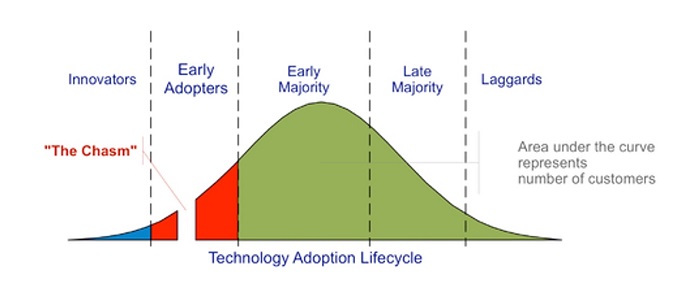Happy New Year! As I contemplate what 2023 portends from a contact center and customer experience perspective, reflecting on the highlights of 2022 is in order. In the past twelve months, three industry developments occurred that will shape how vendors and customers approach the contact center in the year ahead, which I’ll explore in detail below.
1. Migration to the Cloud: Beyond Innovators
How can migration to the cloud possibly be news I hear you say? Digging into the No Jitter archives, I
found that 14 years ago I was writing about the still-nascent software-as-a-service market for contact center solutions, discussing offers from Interactive Intelligence, Cosmocom, and LiveOps.
From the perspective of history, it becomes clear that the innovation phase of contact center as a service (CCaaS) – shown in the technology adoption curve
here – lasted for over a decade.
I would argue that the COVID pandemic was the catalyst for the CCaaS market to “Cross the Chasm,” as described by Geoffery Moore in
his 1991 book. Moore contends a chasm exists between the early adopters of a product, who are the technology enthusiasts and visionaries, and the early majority. With the immediate need to move agents to work from home, the technology honed over ten-plus years was ready for broad deployment in 2020.
With the pandemic proof point, vendors and customers became more willing to embrace CCaaS as the contact center software model. From a customer perspective, we have seen an increased willingness on the part of enterprises to move very large contact centers (1,000+ agent seats) to public cloud solutions. In October 2022,
Genesys announced its intention to concentrate marketing and sales efforts on its public cloud solution. The continuing financial issues at Avaya are also playing a role in the willingness of large companies to embrace what are now tried-and-true CCaaS solutions.
Even with the macroeconomic headwinds seen as we enter 2023, I believe CCaaS solutions will continue to show strong double-digit growth, as technology adoption pushes through the early majority.
2. New CCaaS Players
While the CCaaS market has been around for almost twenty years, the fact remains that ~70% of contact center agents are still working behind a premises-based system – and that continues to spell opportunity. In 2022 alone, No Jitter documented the entrance or expansion of three major enterprise cloud software players into the CCaaS market. Here’s a look back:
- February: Zoom announced Zoom Contact Center, initially voice and video channels only. The purchase of conversational AI company Solvvy in May 2022 boosted both the breadth of its portfolio and contact center executive talent.
- March: Google announced it would pair its very successful Contact Center AI solution with Ujet CCaaS to create a fuller contact center portfolio.
- July: Microsoft expanded its previously announced Digital Contact Center Platform with components from its acquisition of Nuance.
Each of these CCaaS announcements met with high interest from the customer experience community. Admittedly, however, none has yet made a significant impact on the overall contact center market in terms of user adoption. 2023 will be the year where one or two of these begin to rise above the rest. From what I’ve seen so far, in terms of product development and interest from a huge customer base, I’m betting on Zoom.
3. What Comes After CCaaS?
Almost two decades after the beginning of the cloud contact center market, thought leaders in both the customer and vendor camp are beginning to discuss — and define — what comes next.
One element of reinvention relates to the openness of contact center software. When Amazon Connect and Twilio Flex came on the scene five-six years ago, the build-versus-buy discussion began. In 2022, both customers and vendors acknowledged that a better combination of buy plus build is what companies want. And contrary to the oft-voiced wisdom, it is not just big companies that want customization and small ones that want out-of-the-box solutions.
In an
article published in early 2022, I shared an interview with a representative from grill company Traeger Inc., a company that is a self-described contact center builder that leverages Amazon Connect. Market leader NICE’s perspective on
the topic was encapsulated by its use of the term
suiteform. NICE CEO Barak Eilam defined suiteform as the combination of a suite and a platform, which will be “the new standard moving forward.” From both the customer and vendor point of view, one goal of openness is to be able to access and use data from across a company to improve and personalize the customer experience.
Another vector of reinvention is related to the rise of digital interactions with customers. The proportion of voice interactions has been dropping consistently over the past few years. While live interactions with human agents are still an important part of contact center operations, the voice expertise that defined contact center leadership in the past is being challenged.
In 2022, Verint began
re-inventing itself as a company that offers many of the elements of a modern contact center solution – but allows user companies to choose from a broad array of voice partners. Few would argue that
Salesforce is a formidable player in the contact center market – while also partnering with others in the market for the voice element.
It is no coincidence that the contact center general session at Enterprise Connect in March is titled "
What Comes After CCaaS." Join me and executives from Genesys, Five9, NICE, Salesforce, and Verint, where we will continue this conversation.











